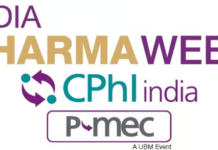New Delhi, January 16, 2016 : The U.S.-India Business Council (USIBC) in partnership with the Department of Industrial Policy and Promotion (DIPP) and the Investment and Technology Promotion Division (ITP) of the Ministry of External Affairs is convening policymakers,global experts, industry leaders, and relevant stakeholders on January 14, 2016 in New Delhi for a conference entitled “Growing the Innovative Bio-pharmaceutical Industry and Expanding Healthcare Access in India”.
“India is already a global leader in pharmaceuticals,” said Dr. Mukesh Aghi, President of USIBC. “With the right vision and policies as well as human capital, it is poised to grow and increase R&D spends domestically while also attracting investment from global players in clinical research and other areas important to drug development and discovery”.
Experts including Professor Meir Pugatch, IPKM Chair University of Maastricht; Professor Frank Lichtenberg from Columbia University; and Mike May from Scientific American Worldview will present empirical studies and provide their perspective on how India can become a global leader in the R&D and biopharmaceutical sector while also expanding healthcare access in country.
“We believe that India has the unmatched potential to be a global top 10 competitor in the innovative life sciences and biopharmaceutical sector,” said Jeff Kemprecos, Executive Director Emerging Markets Public Policy at Merck & Co., Inc., which operates as MSD in India.“Competitiveness in this strategic sector can be enhanced through robust intellectual property, globally aligned rules and regulations and simpler taxation.”
“_Scientific American Worldview_’s seven years of meta-analysis on data from 54 countries reveals that it takes a broad collection of features – from infrastructure and economics to intellectual-property protection and venture capital – to innovate in biotechnology, and the results provide a prescription for improvement in countries are looking to move that are interested in becoming more globally competitive in this sector,” said Mike May, Editorial Director for Scientific American Worldview.
Professor Meir Pugatch, IPKM Chair University of Maastricht and Managing Director Pugatch Consilium, added, “By addressing the most urgent policy elements within the area of clinical research – such as clarifying ambiguous definitions, procedures and protocols governing clinical research within the Drugs and Cosmetics Act, increasing resources for needed capacity building, funding and infrastructure and improving the legal/ IP environment – India stands to increase its number of new clinical trials per year from around 170 to above 800 and add over 600 million dollars in direct monetary transfers and indirect economic gains.”
While Indian scientists and clinicians are contributing strongly to advancing human health, today most of their value creation is outside India. Additionally, while India is amongst the global leaders in pharmaceutical exports, yet access issues persist domestically. The conference will explore what successful competitor countries are doing to attract R&D dollars and manufacturing while also investing to improve their healthcare outcomes.
In terms of overall health and economic outcomes, “studies of numerous countries have shown that pharmaceutical innovation has had substantial positive effects on longevity and productivity, and that it has reduced the need for costly hospital and nursing home care,” said Professor Frank Lichenberg, PhD. Professor at Columbia University.
Corporate Comm India(CCI Newswire)






















